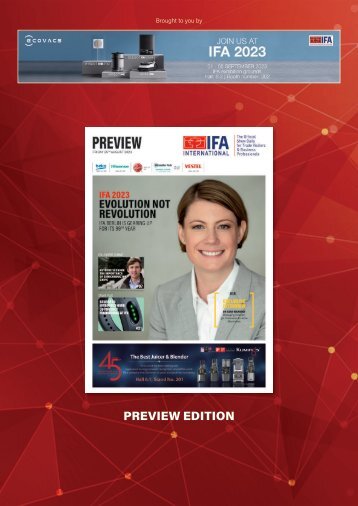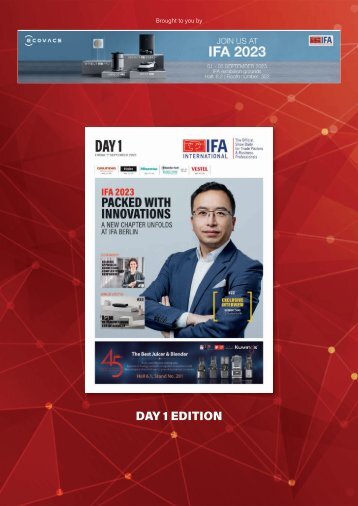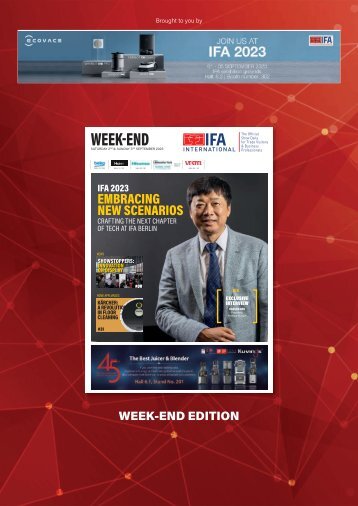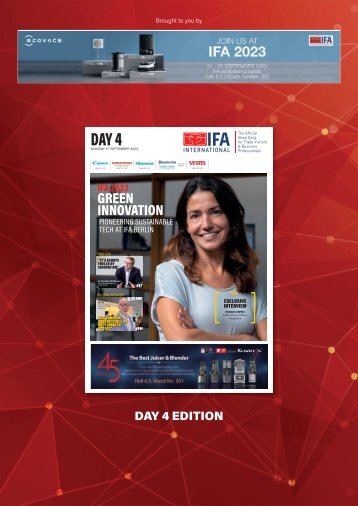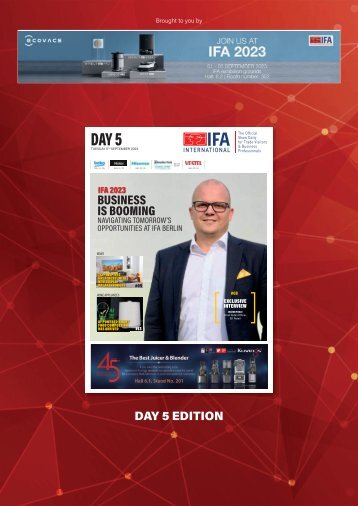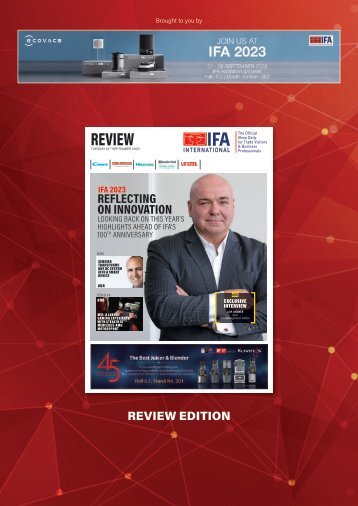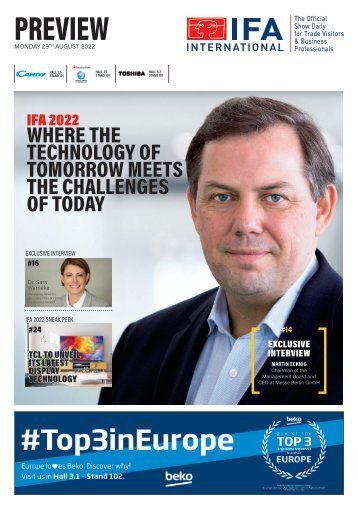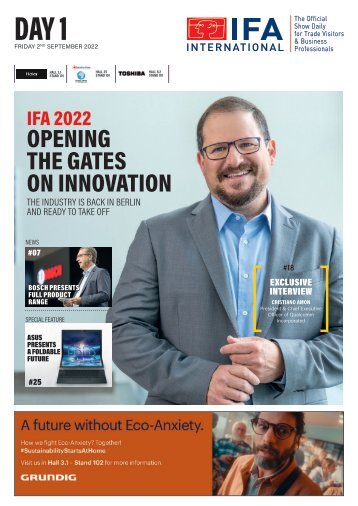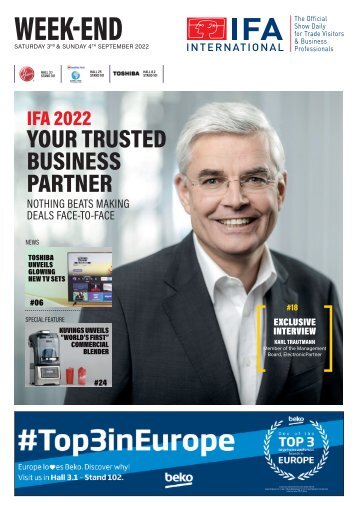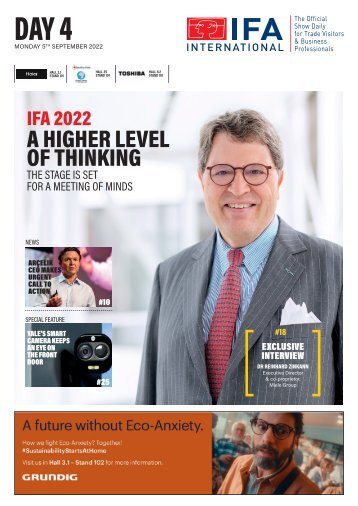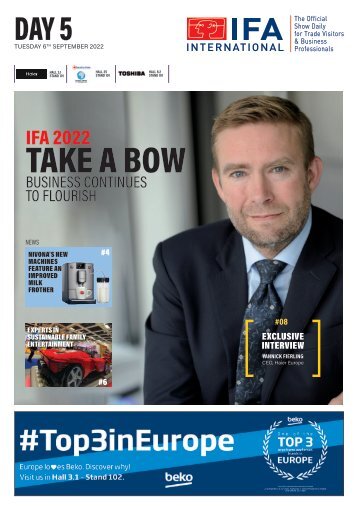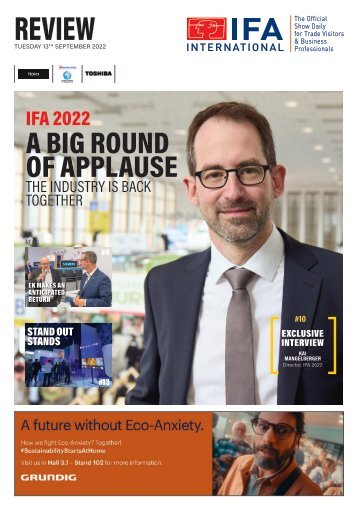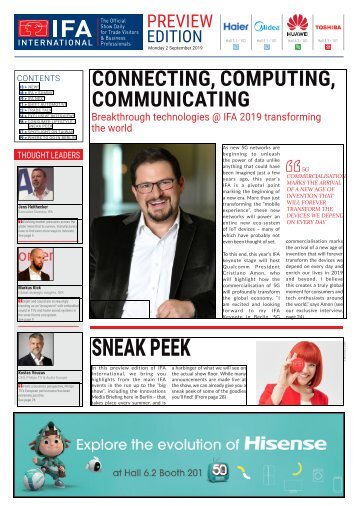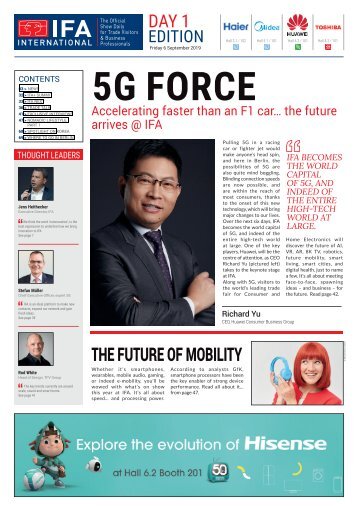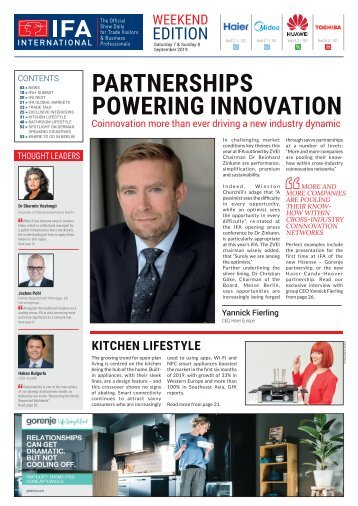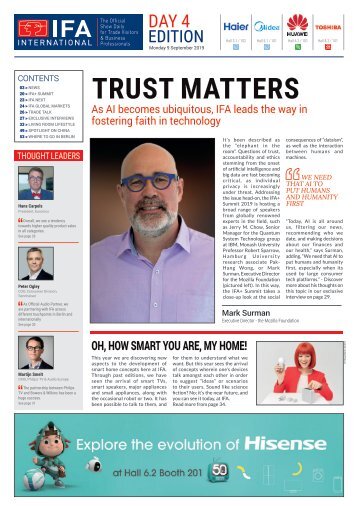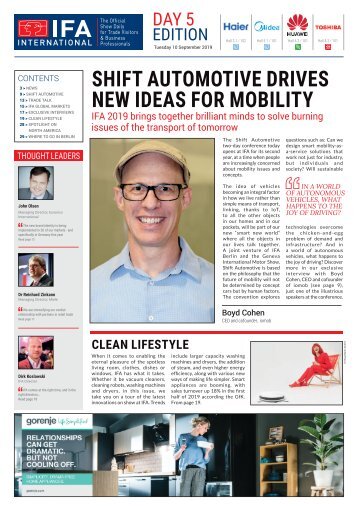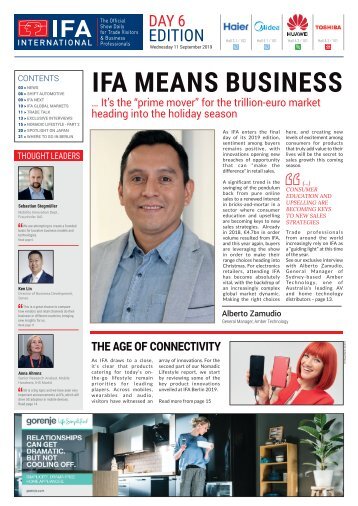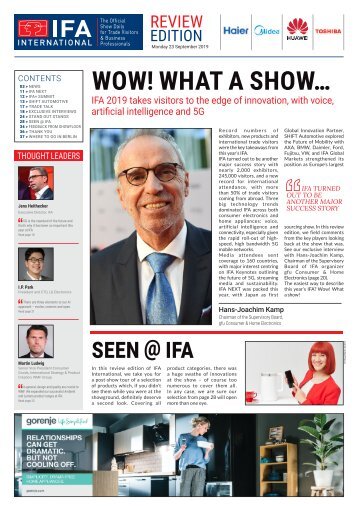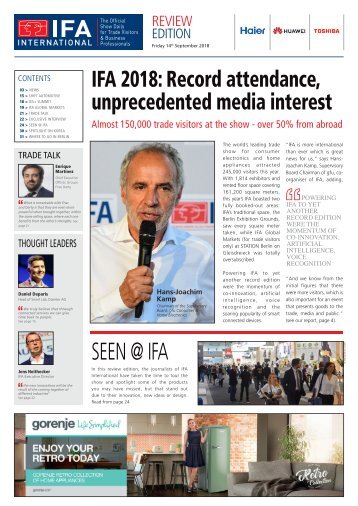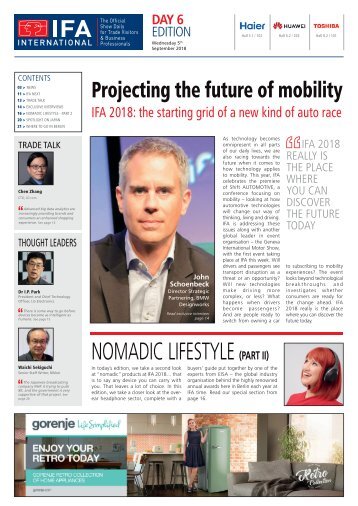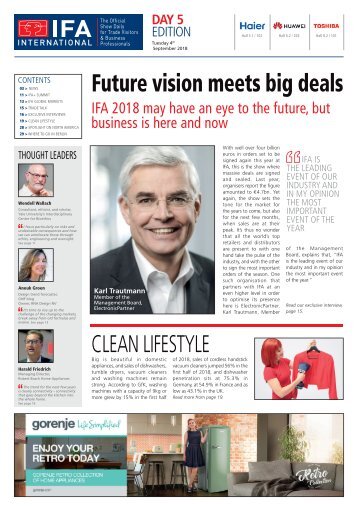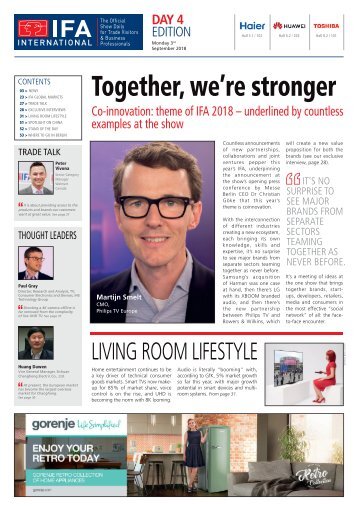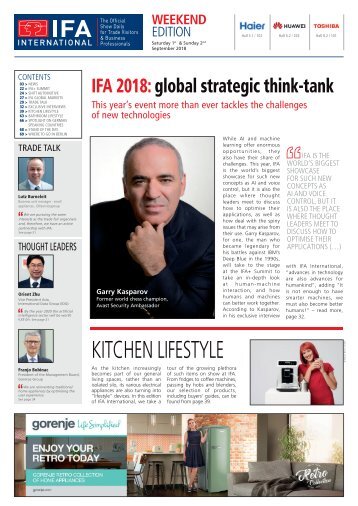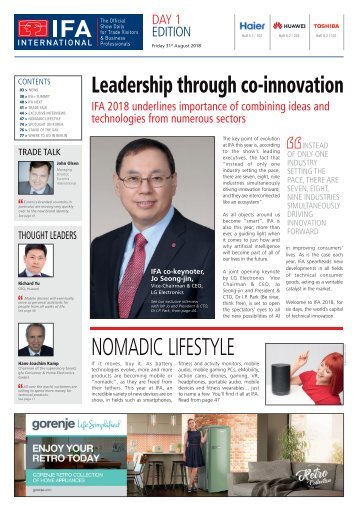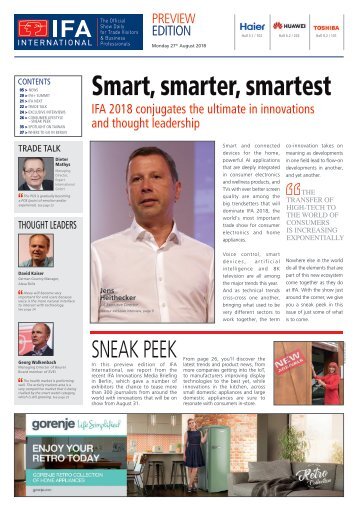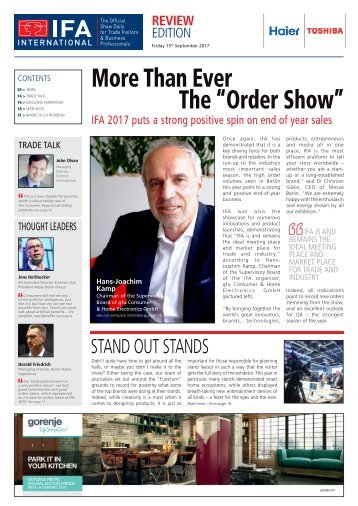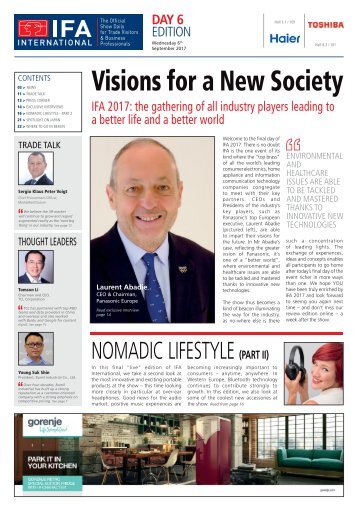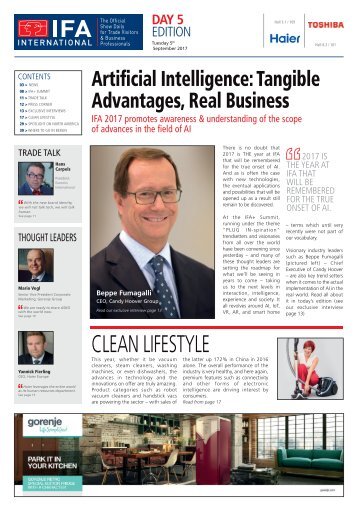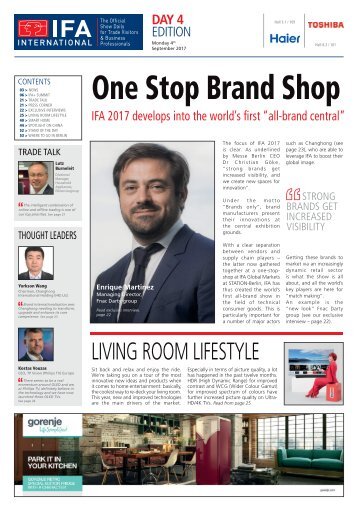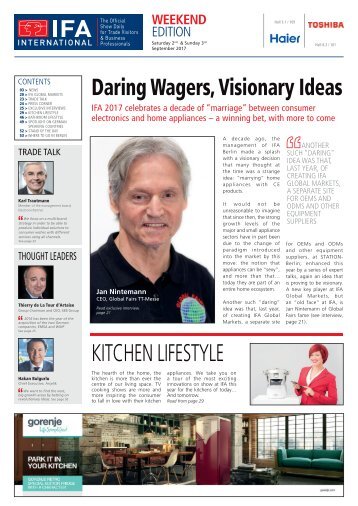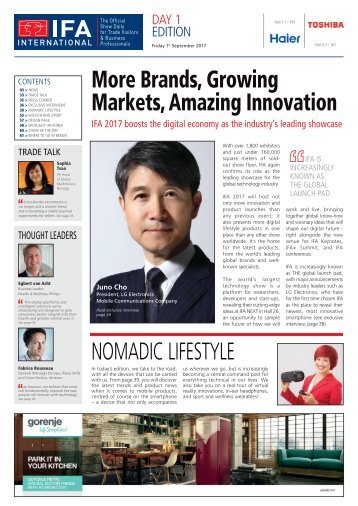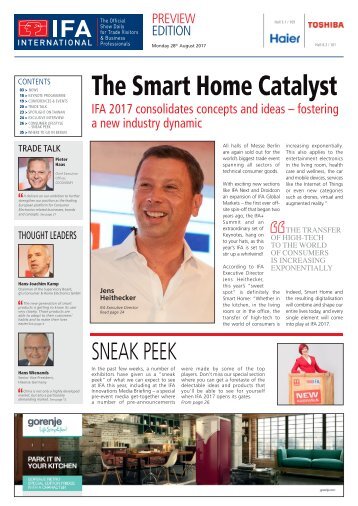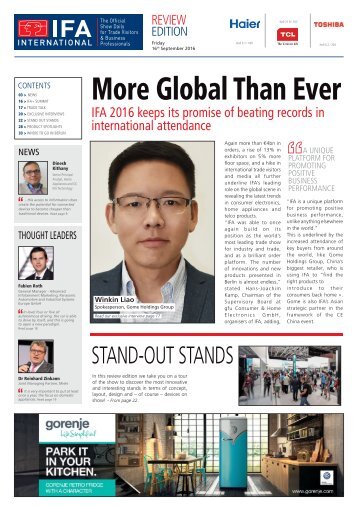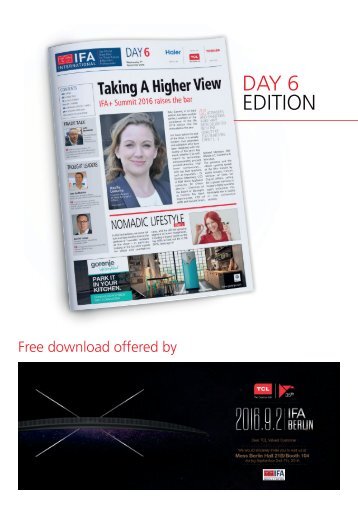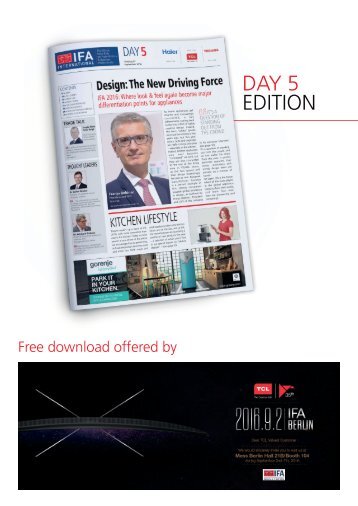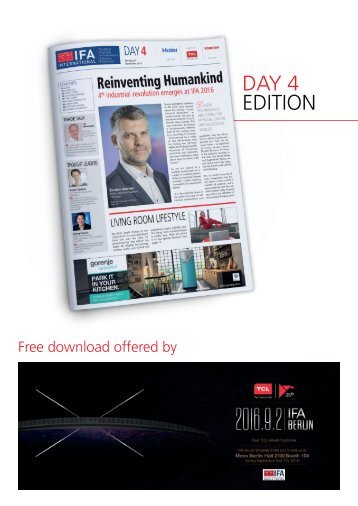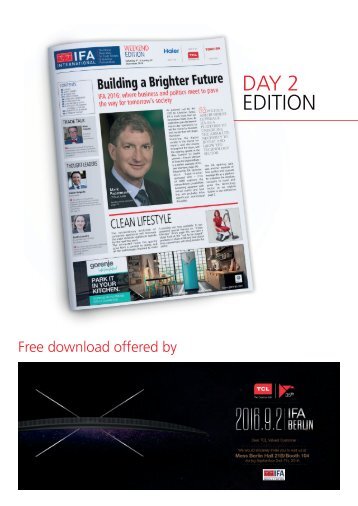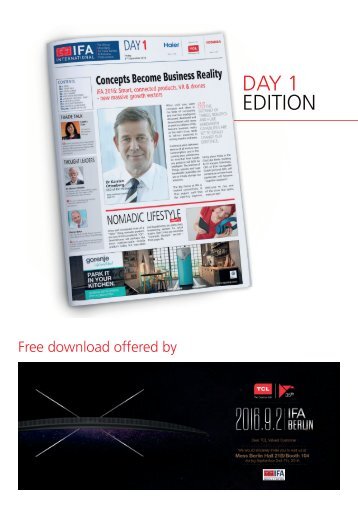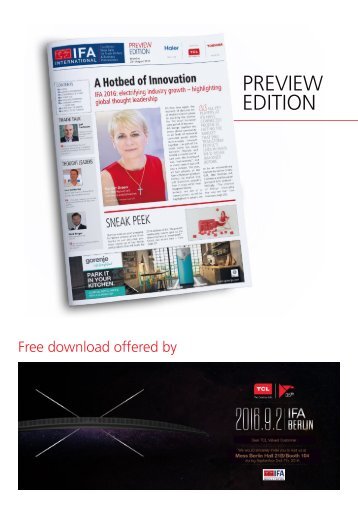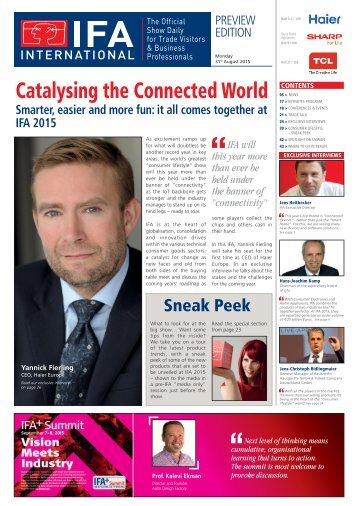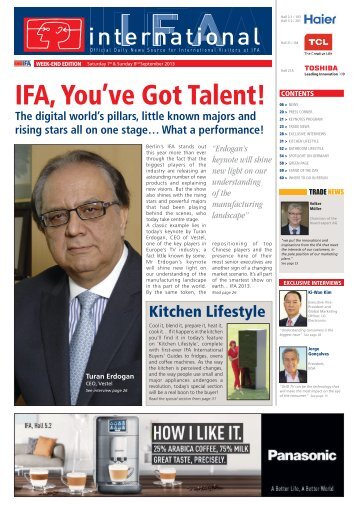
IFAINT22_D4_Online
- Text
- Products
- September
- Global
- Berlin
- Consumer
- Appliances
- Innovative
- Electronics
- Speakers
- Innovation
- Www.cleverdis.com
I NEWS I Arçelik CEO
I NEWS I Arçelik CEO makes urgent call to action “You won’t like what you’re going to hear,” were the opening words of Arçelik CEO, Hakan Bulgurlu, during his keynote address at IFA Berlin on Friday. ARÇELIK'S ROLE IN INNOVATING SUSTAINABLE SOLUTIONS The Arçelik CEO discussed how his company is acting sustainably and combatting climate change, being carbon neutral in Scope 1 and 2 emissions. Over the past 10 years, the company has reduced washing machines’ consumption of energy [threefold], of water by 20%, along with sustainable updates to dishwashers too. Next is a commitment to reduce Scope 3 emissions in the near future. Hakan Bulgurlu CEO, Arçelik For those appliances, water usage has been reduced to 6.9 litres. Furthermore, half the water used in the previous wash is saved, and used for the next. “If you multiply this by millions of appliances, this makes a real, massive difference”, Mr. Bulgurlu says. “Basically we’ve attacked, and made this a priority for us,” he continued. “We have created the most efficient appliances.” Mr. Bulgurlu also noted that the net zero target for carbon emissions by 2050 only continues to drive innovate solutions. Beko’s SaveWater line was cited as a key example of innovation, saving a total of up to 7.8 litres of water with every cycle. “Every cycle saves a little, and saves a lot,” was a standout statement regarding the line of appliances Mr Bulgurlu called for immediate action to combat climate change in his keynote presentation, saying “I don’t believe in a world where people can get richer and the planet poorer.” The Arçelik CEO started by delivering a long list of cold hard facts about the climate emergency: Europe’s worst drought in centuries, the Rhine at its lowest level in generations and the Arctic warming four times faster than the rest of the world. He noted that demand for appliances is growing by the day, with 3.6 billion cooling devices (air conditioners, refrigerators, freezers) in the world. By 2050, that number could be as much as 14 billion. “We cannot cope with the energy demand of 3.6 billion cooling appliances today, how are we going to cope with 14 billion in the future unless we change completely…?”. Mr. Bulgurlu has achieved great success as CEO of Arçelik. The company's brands Beko and Grundig, just reported their most successful year in history in 2021. He recently became the president of APPLiA - Home Appliance Europe, a Brusselsbased trade association that provides a voice for the home appliance industry. But it was not company milestones, or individual success, that was the focus of Mr. Bulgurlu’s keynote speech, but the ever-severe climate emergency. “The hottest topic of the planet is the heating planet", he said. WE HAVE TO GET TO A NET ZERO FUTURE... In 2019, before the global pandemic, Mr. Bulgurlu climbed Mount Everest to help raise awareness for climate change. The world’s tallest mountain is in fact a metaphor for the emergency itself. “Tackling climate change is one hell of a mountain to climb,” he said of his journey. “But as my experience has taught me, even the tallest peak is possible to overcome.” How does Mr. Bulgurlu propose we address the climate emergency? “We have to get to a net zero future, we have to limit global warming to 1.5C by the end of the century […] nothing else matters", he says. Energy efficiency was also mentioned as a key method to help combat climate change. "The cleanest fuel in the world is the energy we don’t use,” was Mr. Bulgurlu's simple statement. He also pointed to wider solutions through policy-making. “There’s a very painful tension between our energy consumption goals and our environmental goals,” he said. “The only solution here is a carbon tax, pricing that carbon into every product that’s made if we continue to use fossil fuels.” The CEO also called for regulation of water efficiency, and strict standards for manufacturers to produce the most energy efficient devices possible. Furthermore, the president of APPLiA is actively working with global governmental bodies to define standards on a global level 10 IFA INTERNATIONAL • MONDAY 5 TH SEPTEMBER 2022 news.ifa-berlin.com
I NEWS I Autonomous driving requires cars to learn autonomously SHIFT Mobility recognises the obstacles to driverless cars HALL 27 Self-learning AI-eye-view of the road using the helm.ai technique Since its 2018 debut at IFA Berlin (then called SHIFT Automotive) SHIFT Mobility continues to demonstrate, explore, explain and debate the future of automotive and mobility technologies. Now that electric vehicles (EVs) are an accepted and essential presence on our roads, the next junction for automotive and tech is autonomous vehicles: when will cars no longer require human drivers? This topic dominated the two day convention. AI is active in most modern cars and there are several examples of autonomous (driverless) vehicles already operating, for example robotaxis in designated zones in China and US. Speaking at the conference on Friday, Manuel Yoon, VP of strategy at Israeli software company Autobrains asserted: "The automotive industry has invested 0bn into autonomous vehicle technology. But even Tesla - the most advanced - are not quite there yet". Yoon suggested that the traditional approach to building the AI and dataset required for safe autonomous driving, where the car "learns" the parameters of the road, is not sufficient. "Manuallylabelled data - supervised learning, humans assigning attributes frame-by-frame to captured filmed data - is time consuming, expensive and prone to errors," he said. "But if you build software that allows the AI to mimic the way humans learn, it removes the need for the human component." Autobrains has a system: self-learning AI, applying signatures to obstacles/objects on the road, and creating perception fields - imitating how the human brain works. "Driving is intuitive. We can mimic this by creating 'force fields' around objects, assigning them likely behaviours based on previous learning," Yoon added. The need to adopt unsupervised learning was a common theme. Toby Wessels, chief development officer of Silicon Valley startup helm.ai, said "Historically, using the traditional method of supervised learning has been a challenge. It can cost a company bn and they try to start at L4 [fully autonomous] which is like turning up at the Olympics having never trained for the sport. To achieve autonomy you need three things - the tech, the data and money. Some big companies are not willing to pay - it's too complex and expensive. We work with OEMs: we license the product to them, with arbitrary input data to teach a system using existing video, and inform AI's neural nets. At this rate, we should have autonomous driving vehicles by mid-decade, maybe sooner for inner-city driving and fixed repeatable routes - like warehouse to supermarket" GREATER AUTONOMY LEADS TO GREATER SUSTAINABILITY On the topic dominating IFA 2022 - sustainability - the advantages of autonomous driving are manifold. Tobias Wessels, chief development officer, helm.ai, told the SHIFT Mobility conference on Friday: "With no human in the car, there is no need for cooling or heating systems, so the vehicle weight is reduced and less energy consumed. Driving at slower speeds, there is less wind resistance. Often one vehicle can operate for 24 hours, eliminating the need for two vehicles sharing the burden if driven manually. Just these factors can represent a 40% energy saving even over an EV," Wessels said IFA INTERNATIONAL • MONDAY 5 TH SEPTEMBER 2022 11
- Page 1: DAY 4 MONDAY 5 TH SEPTEMBER 2022 HA
- Page 5 and 6: Last year the Kaiser brand celebrat
- Page 7 and 8: I NEWS I ADVERTORIAL Five top sourc
- Page 9: I NEWS I Honor embraces connected f
- Page 13: I NEWS I Schneider Electric aims fo
- Page 17 and 18: I TRADE TALK I Société Française
- Page 19 and 20: I EXCLUSIVE INTERVIEW I 5 september
- Page 21: I AUDIO / HOME LIFESTYLE I SPECIAL
- Page 25 and 26: I HOME & ENTERTAINMENT I SPECIAL FE
- Page 27 and 28: Bubbles without bottles: Carbon8 la
- Page 29: ADVERTORIAL STAND OF THE DAY VinFas
- Page 33 and 34: HALL 1.1 - STAND 107 HALL 1.1 - STA
- Page 35: HALL 4.1 - STAND 208 HALL 5.1 - STA
Inappropriate
Loading...
Mail this publication
Loading...
Embed
Loading...

IFA International
- IFA International 2023
- IFA International 2022
- IFA International 2020
- IFA International 2019
- IFA International 2018
- IFA International 2017
- IFA International 2016
- IFA International 2015
- IFA International 2014
- IFA International 2013
- IFA International 2012
- IFA International 2011
- IFA International 2010
- IFA International 2009
- IFA International 2008
- IFA International 2007
